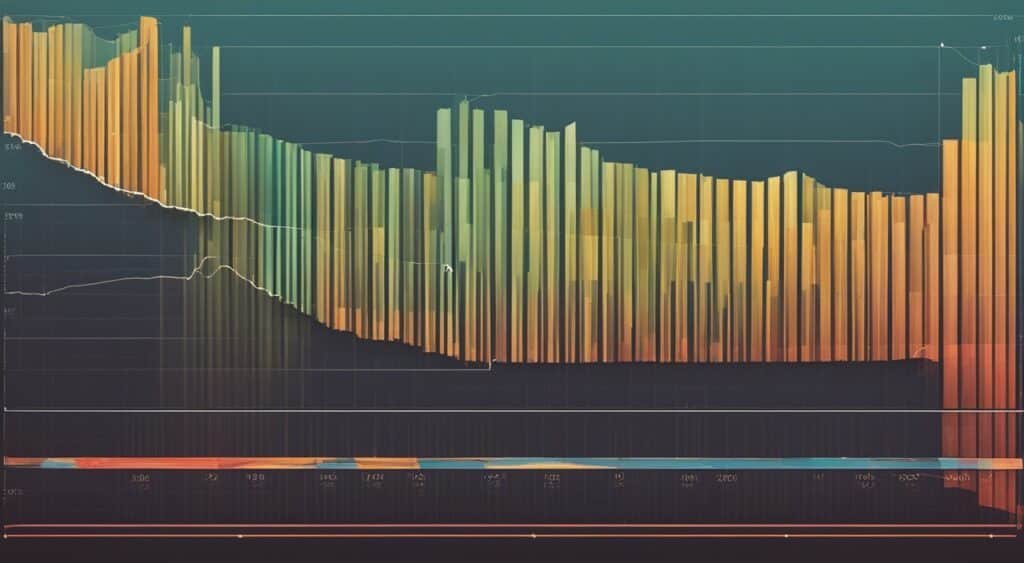What Is A Home Equity Loan And How Does It Work?
A home equity loan lets you borrow against your home’s equity. Equity is the value of your home minus what you owe on your main mortgage. This loan gives you a lump sum of money at a fixed interest rate, often lower than personal loans or credit cards.
People use home equity loans for things like fixing up their homes, paying off debt, or covering big bills. But, remember, your home is the loan’s security. If you can’t pay back the loan, you could lose your home.
Key Takeaways
- A home equity loan is a type of second mortgage that allows you to borrow against the equity in your home.
- Home equity loans typically offer a fixed interest rate lower than other consumer loans.
- Home equity loans can be used for home improvements, debt consolidation, and other large expenses.
- Using your home as collateral for a home equity loan comes with the risk of foreclosure if you can’t make the payments.
- The amount you can borrow depends on your home’s value, your existing mortgage balance, and your personal financial situation.
Understanding Home Equity Loans
A home equity loan lets homeowners borrow money using the equity in their home. This is done by using the market value of your home minus your mortgage balance as loan collateral. These loans have a fixed interest rate and you pay back in monthly payments over time.
Definition and Key Features
Home equity loans give you cash upfront that you pay back in fixed monthly payments. They don’t replace your current mortgage but add another one on top of it. This makes them a good choice for things like home renovations, debt consolidation, and big expenses, often at a lower interest rate than other debts.
Benefits of Home Equity Loans
- Access to funds for home improvements or other financial needs
- Potentially lower interest rates compared to credit cards or personal loans
- Fixed monthly payments over the loan term
- Potential tax deductions on the loan interest (consult a tax professional)
But remember, using your home as collateral means you could lose it if you can’t make the loan payments. Homeowners should think about the risks and benefits before getting a home equity loan.
Home Equity Loan Rates in 2024

Home equity loan rates have changed in 2024, making borrowing more expensive. Now, the average rate for a $30,000 home equity loan is about 9%. This is a big jump from the 6% rate in 2022.
Even with higher rates, these loans are still cheaper than credit cards and personal loans. Those rates can go up to double digits.
The Federal Reserve might cut interest rates soon, which could help homeowners. But any cuts are likely to be small. Borrowers need to think about the higher costs now versus possible future benefits of using their home equity.
| Loan Type | Average Rate in 2022 | Average Rate in 2024 |
|---|---|---|
| Home Equity Loan | 6% | 8.9% |
| Credit Card | 16.3% | 18.1% |
| Personal Loan | 10.7% | 12.4% |
When thinking about a home equity loan in 2024, consider the costs and benefits. This could be for home improvements, paying off debt, or other financial needs. Make sure to look at your own financial situation and goals.
“Homeowners must carefully evaluate the tradeoffs between the higher borrowing costs and the potential advantages of accessing their home equity in the current market.”
Stay updated on home equity loan rates and economic trends. This way, you can make choices that fit your financial goals.
Factors Affecting Home Equity Loan Rates

Getting a home equity loan depends on several important factors. These factors affect the interest rate a homeowner gets. It’s key for borrowers to know these factors because they change the loan’s cost.
Credit Score and Credit History
Lenders look at the borrower’s credit profile first. Homeowners with high credit scores and a solid credit history get better interest rates on their loans. They are seen as less risky, making them better candidates for loans.
Loan-to-Value Ratio
The loan-to-value (LTV) ratio is also important. It shows how much of the home’s value is covered by the loan. A lower LTV ratio means more equity in the home. This can lead to better interest rates and terms.
Debt-to-Income Ratio
Lenders also check the debt-to-income (DTI) ratio. This ratio looks at monthly debt payments versus monthly income. A lower DTI ratio means less debt and can lead to better loan approval and interest rates.
Knowing these factors helps homeowners get the best home equity loan rates. This way, they can reach their financial goals.
How Does a Home Equity Loan Work?

A home equity loan lets homeowners use the equity in their property to get money. This loan gives you a big sum of money. It’s great for things like fixing up your home, paying off debt, or big expenses. But, knowing the loan’s details and how you’ll pay it back is key.
Borrowing Against Home Equity
The loan amount depends on your home’s value and the mortgage you still owe. Lenders look at your home equity, which is your home’s value minus the mortgage debt. This equity is the loan’s security, letting you borrow against home equity.
Repayment Terms and Conditions
Home equity loans have fixed interest rates and repayment terms from 5 to 30 years. You’ll pay back the loan in regular monthly payments, like a regular mortgage. But, remember, this loan is a secured loan. This means your home is the loan’s security. Not paying could lead to foreclosure risk.
| Loan Type | Interest Rate | Repayment Term | Collateral |
|---|---|---|---|
| Home Equity Loan | Fixed | 5-30 years | Home |
Understanding home equity loans helps homeowners decide if it’s right for their financial plans and goals.
Home Equity Loan Requirements

Applying for a home equity loan means meeting certain criteria set by lenders. These rules help check if you’re a good candidate for the loan. They look at your credit score and financial stability to make a smart lending decision.
Credit Score Minimums
A good credit score is key for getting a home equity loan. Most lenders want a score in the mid-600s or higher. If your score is lower, you might struggle to get approved or could pay higher interest rates.
Income and Employment Verification
Having a steady job and regular income is important for loan approval. Lenders look at your job history, income, and debt-to-income ratio, which should be under 43%. If you’ve had many jobs or your income is not steady, you might find it harder to get approved.
Lenders also check the loan-to-value (LTV) ratio, which compares the loan to your home’s value. You usually need at least 20% equity in your home. This means you’ve paid off 20% of your mortgage.
If you’re denied a loan, it’s crucial to fix the issues. Work on improving your credit or reducing your debt before applying again. This can boost your chances of getting the loan you need.
Home equity loan
First, figure out how much equity you have in your home. Equity is what your home is worth minus what you owe on your mortgage. Lenders let you borrow up to 80% of your home’s value, minus your current mortgage balance.
Calculating Available Home Equity
To find your home equity, know your home’s value and your mortgage balance. Use online tools or talk to a real estate expert to estimate your home’s value. Then, subtract your mortgage balance to see how much equity you have.
For instance, if your home is worth $300,000 and your mortgage is $150,000, you have $150,000 in equity.
Typical Loan Amounts and Limits
Home equity loans usually range from $10,000 to $300,000. Your credit score, debt-to-income ratio, and loan-to-value ratio affect the loan amount you can get. Lenders also have their own rules for loan limits.
| Loan Amount | Loan-to-Value Ratio | Credit Score | Debt-to-Income Ratio |
|---|---|---|---|
| $50,000 | 70% | 700+ | 43% or less |
| $100,000 | 75% | 720+ | 40% or less |
| $200,000 | 80% | 740+ | 38% or less |
The loan amount you can get depends on your finances and the lender’s rules. Think about your needs and the risks and benefits of a home equity loan before you decide.
Using a Home Equity Loan Effectively

A home equity loan can be a strong financial tool. It’s key to use it smartly. The best ways to use it include improving your home, paying off debts, and covering big, unexpected costs like medical bills.
Home Improvements and Renovations
Using a home equity loan for home improvements and renovations is a wise choice. These projects make your home better and can raise its value. Some upgrades, like energy-efficient ones, might even get you tax deductions, boosting your savings.
Debt Consolidation
Debt consolidation is another smart use for a home equity loan. Paying off high-interest debts with it can lower your interest rates and make payments easier. This can save you money over time and help you pay off debt faster.
Other Appropriate Uses
Big, unexpected bills like medical costs or college tuition can be covered by a home equity loan. This can help you avoid draining your savings. But, it’s not good to use it for things you don’t really need, as it risks your home.
Always use a home equity loan with a plan to improve your finances. Knowing the best ways to use this tool lets you make the most of your home’s value and control your financial future.
“Using a home equity loan effectively can be a game-changer for your finances. Just be sure to weigh the pros and cons carefully and use it for the right reasons.”
Pros and Cons of Home Equity Loans
When thinking about a home equity loan, it’s key to look at both the good and the bad sides. These loans can offer lower interest rates than other types of loans. This makes them a good choice for homeowners. But, it’s important to know the risks before deciding.
Advantages of Home Equity Loans
One big plus of a home equity loan is that you can borrow against your home’s value. This gives you access to funds at a lower interest rate. It’s great for things like home improvements, paying off debt, or big expenses. Plus, the interest you pay might be tax-deductible, depending on your situation. fixed rate, variable rate loan option calculator and credit line depend on principal and interest of home loan.
Also Read: How To Apply For A Wedding Loan?
Potential Drawbacks and Risks
The big risk of a home equity loan is that your home could be lost if you can’t pay back the loan. This could lead to foreclosure, which hurts your credit score and financial health. The process to get a home equity loan is also long and complicated. Homeowners should think hard about whether the benefits are worth the risks before applying.
FAQs
Q: What is a home equity loan?
A: A home equity loan is a type of loan where you borrow against the equity in your home. This loan is typically a lump sum amount that is repaid over a fixed term with a fixed interest rate.
Q: How does a home equity loan work?
A: When you apply for a home equity loan, the lender will assess the equity you have in your home and may offer you a loan based on a percentage of that equity. You receive the loan amount in a lump sum and make fixed monthly payments to repay the loan over the term.
Q: What is the difference between a home equity loan and a home equity line of credit (HELOC)?
A: A home equity loan provides a lump sum amount upfront with a fixed interest rate, while a HELOC allows you to borrow funds as needed up to a certain limit and has a variable interest rate.
Q: How can I qualify for a home equity loan?
A: To qualify for a home equity loan, you typically need to have a good credit score, sufficient equity in your home, and a stable income. Lenders may also consider factors such as your debt-to-income ratio and the loan-to-value ratio of your home.
Q: What can I use a home equity loan for?
A: You can use a home equity loan for various purposes, such as home renovations, debt consolidation, education expenses, or other large expenses. However, it is important to use the funds responsibly and consider the impact on your home equity.
Q: When should I consider getting a home equity loan?
A: You may consider getting a home equity loan when you have a specific need for a large sum of money and want to leverage the equity in your home. It is important to assess your financial situation and consider the terms of the loan before proceeding.
Q: Are home equity loans subject to credit approval?
A: Yes, home equity loans are typically subject to credit approval. Lenders will review your credit history, income, and other financial factors to determine your eligibility for a home equity loan.
Source Links
- https://www.usbank.com/home-loans/home-equity/how-home-equity-loans-work.html
- https://www.nerdwallet.com/article/mortgages/home-equity-loan
- https://www.bankrate.com/home-equity/what-is-home-equity-loan/
